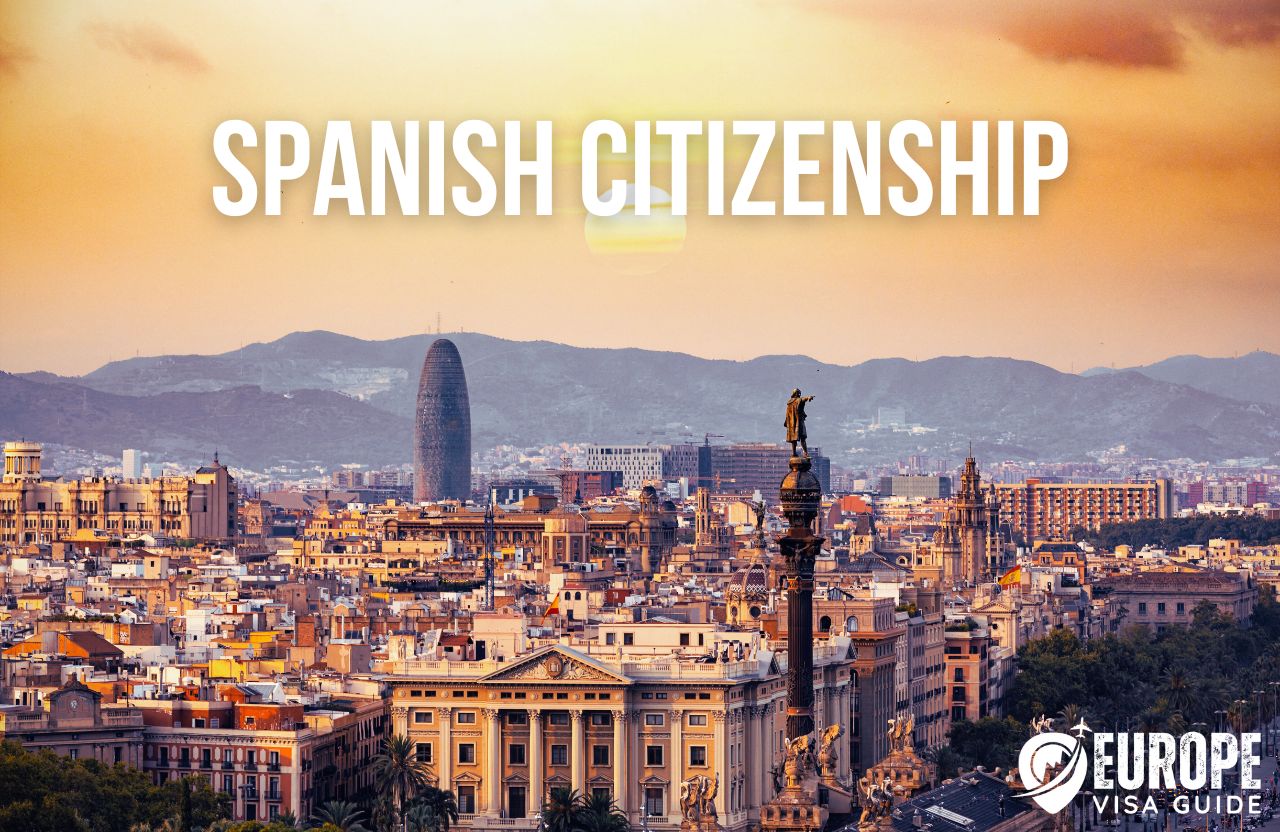
Table of Contents
Are you fascinated by Spanish culture, its rich history, or the beautiful weather? Or perhaps you have Spanish heritage in your family tree. Whatever the reason, Spanish citizenship might be the right pathway for you. In this comprehensive guide, we will discuss the pros and cons of Spanish citizenship, the process and requirements, and different ways to obtain residency in Spain on your pathway to eventual citizenship.
Why Spain?
Spain is one of the most popular expat destinations in the EU, attracting people with its warm climate, colorful history, and excellent food. It is also more affordable than the UK and US in terms of property ownership, utilities, and food. Many British nationals choose Spain as a retirement destination, enjoying a more relaxed lifestyle in its coastal towns. Spain is also experiencing an increase in remote workers and online business owners from all over the world, who take advantage of its non-lucrative visa and digital nomad visa residency pathways.
Spanish Citizenship in a Nutshell
To understand the process and requirements of obtaining Spanish citizenship, it’s important to have a quick overview. Here are some key points to keep in mind:
- Timeline to citizenship through naturalization: 10 years
- Is dual citizenship allowed? Sometimes
- Minimum income requirements for citizenship? None
- Minimum physical stay requirements: 183 days in each year
- Must pay tax in Spain? Yes
- Language requirements: A2 Spanish
- Citizenship test required? Yes
- Passive income pathway available? Yes
- Investor residency (“Golden Visa”) pathway available? Yes
Benefits of Spanish Citizenship
Once you become a Spanish citizen, you automatically gain EU citizenship. This means you have the right to live, work, do business, study, and retire in any of the EU and EEA member states, plus Switzerland. You also gain access to consular protection from the Spanish embassy in your destination country when traveling abroad. Another major benefit is the powerful Spanish passport, which allows visa-free travel to 189 countries. Additionally, as a Spanish citizen, you have the right to vote and run for office in Spain.
Dual Citizenship in Spain
One major consideration when pursuing Spanish citizenship is the question of dual citizenship. Spain typically doesn’t recognize dual citizenship, and you may need to give up your original citizenship to qualify for the Spanish one. However, there are exceptions for certain countries that have a special relationship with Spain, including some Latin American countries.
It’s important to check the current regulations and agreements in place to determine if you can retain dual citizenship with your country of origin. So, does Spain allow dual citizenship? The answer is usually no, but there are specific circumstances where Spanish dual citizenship may be possible. Make sure to thoroughly understand the requirements and conditions for obtaining dual Spanish citizenship if maintaining your original citizenship is of utmost importance to you.
How to Get Spanish Citizenship
There are several ways to obtain Spanish citizenship, so let’s delve into how to get citizenship in Spain through each option:
Spanish Citizenship by Descent
If you have Spanish ancestry, you may be eligible for citizenship by descent. This route, also known as citizenship by “option,” doesn’t require a residency period. You may qualify if:
- Either of your parents is Spanish.
- You were born in Spain to foreign parents, but at least one parent was also born in Spain.
- You were born in Spain to foreign parents of unknown identity or country of origin (e.g., refugees).
- You’re under 18 and were adopted by a Spanish citizen.
Spanish Citizenship by Marriage
Marrying a Spanish citizen is an excellent way to fast-track your pathway to EU citizenship. The residency requirement for citizenship by marriage is only one year of living in Spain. However, you may need to give up your existing citizenship, unless your country has a dual citizenship agreement with Spain.
Spanish Citizenship by Naturalization
Naturalization is the most common route to Spanish citizenship for those without Spanish ancestry or marriage to a Spanish citizen. It requires 10 years of legal residence in Spain, a clean criminal record, and passing two exams: the Spanish language exam and the CCSC cultural exam. These exams demonstrate integration into Spanish society.
Spanish Citizenship by Investment – The “Golden Visa”
Spain offers a “Golden Visa” program, similar to other EU countries like Portugal. The Golden Visa is not an instant route to citizenship but a pathway to residency by making an investment in Spain. You need to renew the residency permit until you reach the five-year mark, at which point you can apply for permanent residency. After five years of permanent residency, you can then apply for Spanish citizenship.
The Golden Visa is usually issued for real estate investment but can also apply to investments in Spanish companies. By taking advantage of the Spanish citizenship by investment program, individuals have the opportunity to gain citizenship in Spain through investing in the country. This Spain investment citizenship scheme allows investors to obtain Spanish citizenship by investing in the country. With citizenship by investment in Spain being a feasible option, interested individuals can secure Spanish citizenship through their financial commitment to the country.
Spain Golden Visa – Investment Options
- Real estate route: Purchase real estate in Spain worth at least €500,000.
- Public debt: Invest at least €2 million in the Spanish public debt.
- Company investment: Buy shares in a Spanish company worth at least €1 million.
- Capital transfer: Deposit at least €1 million in a Spanish bank.
- Employment and Innovation: Invest in creating a new business that will employ Spanish residents and provide scientific and/or technological innovation.
Alternative Routes to Spanish Citizenship
There are several other ways to obtain Spanish citizenship, some of which don’t require the 10-year residency period. These include:
- Refugees: Can apply after five years of residency in Spain.
- Nationals of Spanish-American countries, plus Andorra, the Philippines, Equatorial Guinea, and Portugal: Can apply after two years of residency in Spain.
- Individuals of Sephardic Jewish descent: No need to live in Spain, but ancestral connections and passing the Spanish language exam are required. (Note: The Sephardic Jewish citizenship program is currently on hold.)
Spanish Citizenship Requirements
To apply for Spanish citizenship, you’ll need to gather the requirements for Spanish citizenship various documents and meet the specific requirements for Spanish citizenship. Here’s an overview of what you’ll need to meet the requirements for Spanish citizenship:
- Completed application form
- Original and photocopy of your passport
- Original and photocopy of your valid foreign identity card
- Birth certificate with a sworn translation if not issued in Spanish
- Spanish criminal record certificate
- Criminal record certificate from your home country with a sworn translation
- Marriage certificate (if applicable)
- Government registration certificate
- DELE (language exam) certificate showing a minimum A2 level in Spanish
- CCSE exam certificate or proof of knowledge of Spanish culture and laws
- Proof of payment of the application fee
Permanent Residence in Spain
Before applying for Spanish citizenship, you’ll need to secure permanent residency in Spain, which is the first step in the process. This requires five years of legal and continuous residency in the country, excluding any time spent as a student. Obtaining permanent residency allows you to stay in Spain indefinitely, but it does not automatically grant you the right to vote in Spain or the European Parliament, nor does it provide freedom of movement within the EU. In addition to meeting the residency requirements, you may also be asked to provide proof of finances, health insurance, and other necessary documents when applying for permanent residency, which is essential for ultimately obtaining Spanish citizenship.
Spain’s Non-Lucrative Visa
If you’re a non-EU citizen, obtaining residency in Spain can be achieved through the non-lucrative visa. This visa is suitable for individuals with passive income sources outside of Spain. The requirements include an annual income of at least €30,000 from pensions, rentals, royalties, or investments, as well as private health insurance coverage.
Spanish Citizenship vs Other EU Options
When considering Spain citizenship, it’s essential to compare it with other EU options. Here’s a comparison of Spanish citizenship with popular EU citizenship routes based on key criteria:
|
Country |
Timeline |
Dual Citizenship |
Physical Stay |
Tax Residency Required |
Language Level |
|---|---|---|---|---|---|
|
Spanish citizenship |
10 years |
No |
183 days/year |
Yes |
A2 Spanish |
|
French citizenship |
5 years |
Yes |
183 days/year |
Yes |
B1 French |
|
German citizenship |
6-8 years |
No |
183 days/year |
Yes |
B1 German |
|
Italian citizenship |
10 years |
Yes |
183 days/year |
Yes |
B1 Italian |
|
Portuguese citizenship |
5 years |
Yes |
7 days/year (Golden Visa) |
No |
A2 Portuguese |
|
Irish citizenship |
5 years |
Yes |
183 days/year |
Yes |
English only |
|
Luxembourg citizenship |
5 years |
Yes |
183 days/year |
Yes |
B1 Luxembourgish |
Should You Get Spanish Citizenship?
While there are many advantages to living in Spain, obtaining Spanish citizenship is a long and bureaucratic process. It typically takes at least ten years of residency before becoming eligible to apply. Spain’s restriction on dual citizenship may also be a disadvantage, especially for individuals from countries with powerful passports. It’s important to consider all factors and explore alternative routes to EU citizenship that may offer faster and less arduous pathways. For those already living in Spain, working towards Spanish citizenship could be a logical option.
FAQ
What are the benefits of obtaining Spanish citizenship?
- Obtaining Spanish citizenship grants EU citizenship, visa-free travel to 189 countries, the right to live, work, and study in the EU, and the right to vote and run for office in Spain.
Can I retain Spain dual citizenship if I become a Spanish citizen?
- Spain typically doesn’t recognize dual citizenship, but there are exceptions for certain countries with special relationships. It’s important to check the current regulations and agreements in place.
What are the different pathways to obtaining Spanish citizenship?
- You can obtain Spanish citizenship by descent, marriage, naturalization, and investment through the “Golden Visa” program, or through alternative routes such as refugees, nationals of specific countries, and individuals of Sephardic Jewish descent.
What are the general requirements for obtaining Spanish citizenship?
- The general requirements include completing an application form, providing various documents such as passport, birth certificate, criminal record certificates, marriage certificate (if applicable), and passing language and cultural exams.
Conclusion
Spanish citizenship offers numerous benefits, including EU citizenship, visa-free travel to many countries, and the right to live, work, and study in the EU. However, the path to Spanish citizenship is a long one, requiring years of residency and language exams. It’s essential to weigh the pros and cons, consider dual citizenship restrictions, and explore alternative options before deciding to pursue Spanish citizenship.





